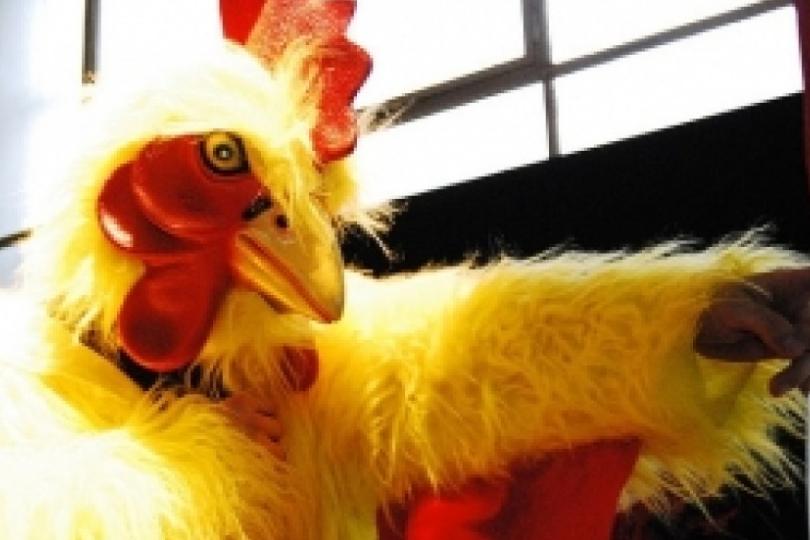For love or money: or how I feed my daughter
Editorial

There are jobs we take for money and jobs we take for love, jobs that feed our soul and jobs that really just don’t. Sometimes it works out that we are able to feed our hearts as well as our children or pets, but usually that’s not the case. Usually you find yourself changing clothes in a linen closet at a Marriott and wondering just where and how everything went wrong.
It’s a little tricky trying to talk about different kinds of work without it becoming a treatise on art—low art and high art, well-paying and no-paying. Do I wear the, thus far proverbial, chicken suit or do I keep that last little shred of dignity that allows me to live? Or should I do the show with the teeny-tiny theater company that will pay me a total of $63 and schedule a "quick" brush-up rehearsal on Christmas morning?
In this article I will do everything in my power not to talk about art because, for some reason, most discussions about art devolve into this:
A: “What kind of world do we live in that would cancel ‘Arrested Development’ and watch ‘Two and a Half Men?”
B: “A stupid world, that’s what.”
A: “Should I get another nonfat Americano?”
[Note: Not actual quotes, but I have seen many of these sentiments relayed in various Facebook statuses.]
[Another note: I think I was asked to write about this topic because I have managed to move seamlessly between different types of theater and still look really thin and well rested. That’s probably not true, but that’s my thesis and I’m sticking with it.]
I think I have the credentials to back up my (fake) thesis. I once helped write a show that a critic declared was “not theater.” She may have been right, but that’s still a pretty crappy thing to say. I’ve also poured my life blood into (sketch, comedy, and/or interactive) shows that critics have reviewed as being “ . . . really moving and well done. Seriously, it was like watching really good theater!” Both of these reviews are on my fridge. Keeps it real for me. It should also be noted that I studied theater in college with an earnestness that bordered on anger. I was Juliet and Antigone and I journaled [Note: not an actual word] as my character in both of those shows. I have a Master’s degree in theater history and I once wrote a paper on Piscator. I know what real theater is, people! [Note: please come and see my new interactive comedy “Employee of the Year” at Bunker Hills Golf Course, opening June 8! For more info: www.employeeoftheyear.org.]
The business we work in is strange for many reasons, but particularly for this: we apologize or see it as a possible liability if we do any work that is popular to a wider audience. Put another way, if a lot of people like something then, ipso facto, it must not be very good (this is the first time I’ve used the phrase “ipso facto” in a sentence and I think it went pretty well). The issue revolves around the term “wider” audience, I think. If a show is meant to connect with a certain segment of the population that we find socially undesirable (people with jobs and houses in mostly white neighborhoods with gun racks in their basement) then we say, “Well, it is what it is! I’m getting out as soon as I can to do some real stuff! Pays the bills!” If the show connects with a more desirable audience (people with jobs and houses in properly diverse neighborhoods and no gun racks), then we say, “I’m so proud to be a part of this! I feel so lucky!”
I have spent a majority of my career in the Twin Cities writing and performing sketch comedy [Note: this is actual theater]. We created every show from the bottom up and performed it without costumes, sets and sometimes lights. Seriously. A “tech-heavy” sketch had two boas instead of one. Yes, these choices were practically driven, “I don’t have time to put on a wig because I have to zip Katy up in this duffle bag,” [Note: actual quote] as well as financially driven, “You guys, we can have this one really good microphone or air conditioning.” But they are the standard artistic conventions for this type of theater. I remember getting really upset once (this was before I had a kid and I had time to get upset over things like a sloppy Harold) that a teeny-tiny theater company (now defunct) got a spotlight in the paper for doing their show with only “two chairs and a red scarf.” Now that was art! Grant-worthy, mind-blowing, relevant, brave art! What?! Change that scarf to a clown nose and that’s what we did every (damn) weekend. I would have made more of a fuss at the time, but I was too busy trying to find a squirrel puppet.
[Note: I have to admit that it does make me a little crazy when I’ll see a comedy at a “real” theater and they’ll, you know, put a guy in a dress and I’ll think, “Wait! We do that! People, you didn’t need to pay $65 to see this! You could be seeing this and eating nachos! Follow me!” But I don’t. I just get really mad at how hard people (still, oh my God still) laugh at a guy in a dress. But that’s another article.]
I once directed a show that shall remain nameless here, not out of shame but because I don’t want the “writers” to find this article on the internet. Let’s just say it rhymes with Queer Clamp. Queer Clamp is about four guys who go out in the woods to “hunt” and end up sitting around in a shack drinking beer and singing songs about farting and coupons. Yes, it’s a musical. I want to be clear: I asked to take on this project. One of my arguments was that it would be “interesting” to market that a woman had taken on Queer Clamp. I like to imagine the sober bus tour from Prior Lake sitting around during intermission talking about how “interesting” it was that they were seeing Queer Clamp through a feminine lens. People wondered (I’m not really sure anyone wondered anything, but it helps make my point) if it was smart for me to be associated with Queer Clamp. I (honestly) thought the show could work and, well, it was a job that lasted a good long time.
At “Domino Stapatola’s” roast (I also don’t want him to find this on the internet because he hasn’t actually retired and could still destroy me), I made mention of the fact that Domino used the phrase “Populist piffle” to describe Queer Clamp, but that I didn’t care because that “piffle” had “fed my daughter for a year.” I remember this getting a big laugh, which was its intent, but it was also true. Queer Clamp paid my bills and then some. More importantly, Queer Clamp had some of the best comedic (and otherwise) actors in the Twin Cities (who also owned their own flannel shirts) and rehearsals were a joy. I miss Queer Clamp for those reasons. I also wish we had called the show Queer Clamp. Queer Clamp is a show that I might actually see.
[Extended Note: As much as many of us rip apart the “popular” hits, there are just as many who are trying to figure out how the hell those Don’t Hug the Church Basement Forever Triple Espresso Plaid franchises keep on going because we wish we could write something that (damn) popular. I mean come on! What’s next, A Don’t Hug Me Trip to Target? [Note within note: actual quote]. I might be going out on a limb here, but I think the dirty little secret about these gargantuan hits is this: they are labors of love by respected, talented and super smart people who work really well together. These are serious artists and yes, they probably are too busy to do your show because they are working full-time in theater, but send them your resume and they might be able to squeeze you in somewhere.]
I just realized that I got all the way to the end of my (too long) article and I didn’t teach you anything. So here goes.
When I am offered a job—real or not—I ask these questions. Feel free to use these as they pertain to you:
1) Will I learn something?
2) How much does it pay?
3) Will the people I work with be nice to me? [Note: if Question 2 is a high number, then this question may no longer apply]
4) Will I get a drink ticket?
[One last note: Everything you do is real. I mean come on.]
Good luck!




